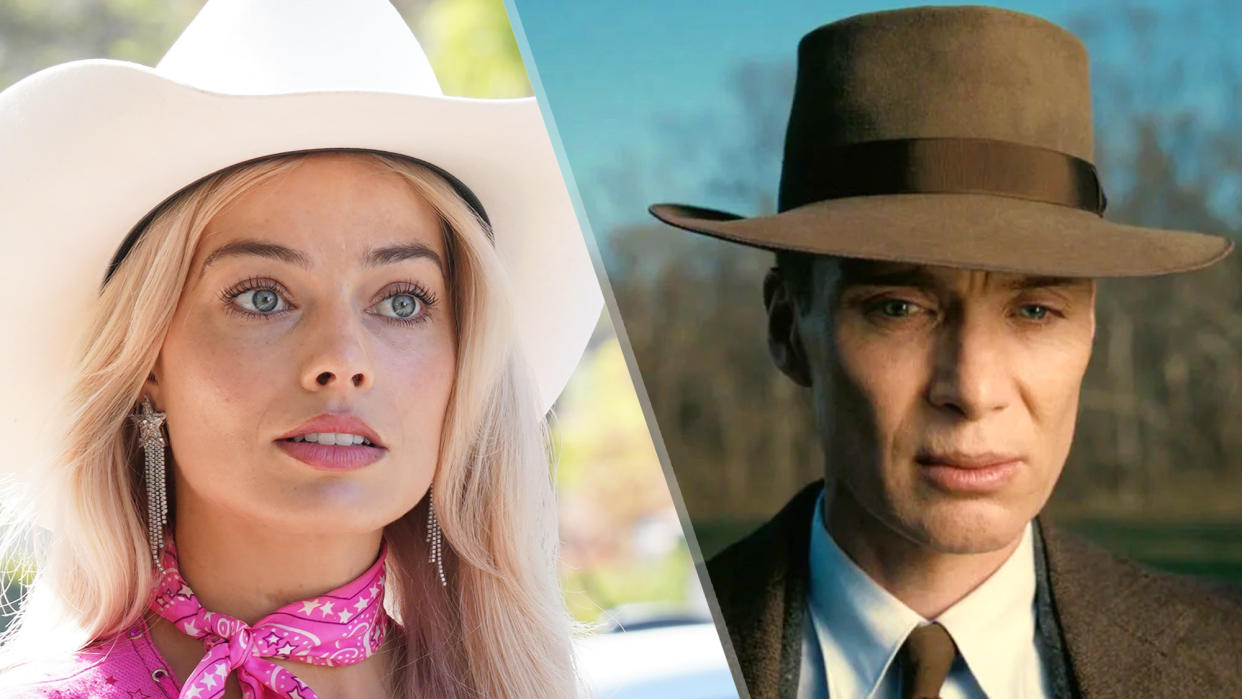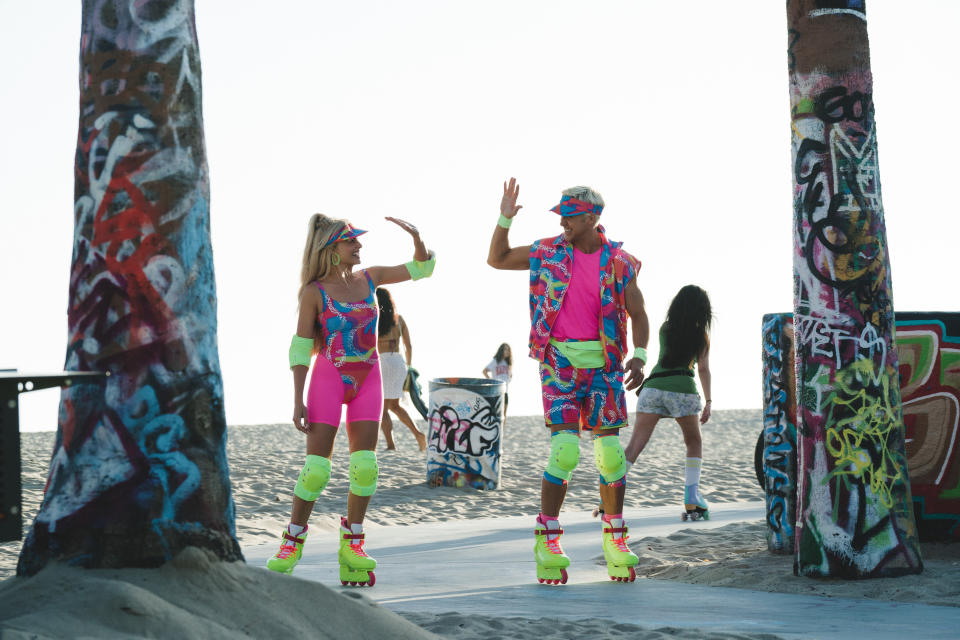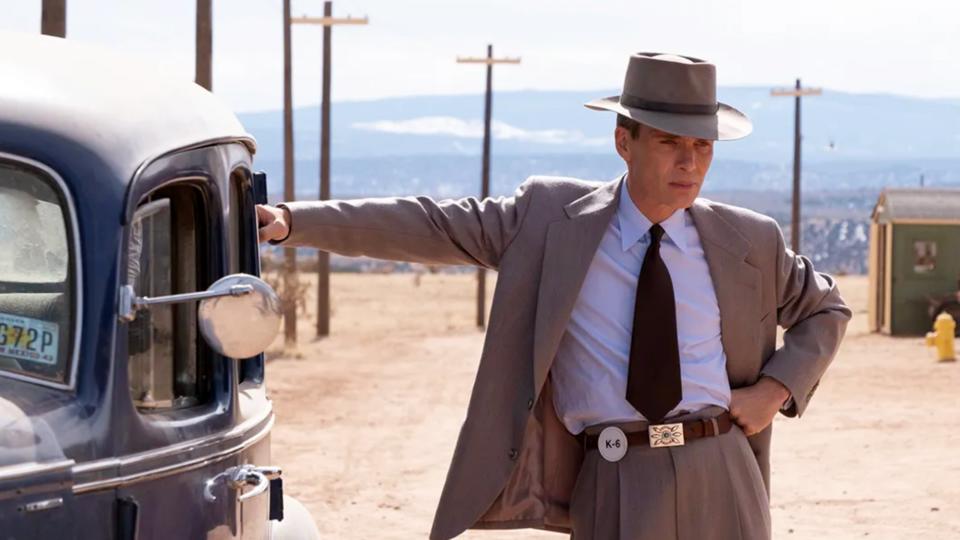I saw Barbie and Oppenheimer opening weekend — and one is obviously better

- Oops!Something went wrong.Please try again later.
- Oops!Something went wrong.Please try again later.
I hated Barbie (and really anything overtly feminine) growing up. Barbie dolls were the default birthday and holiday gift for me and my sisters when family members didn't have a clue what to get, and they just always seemed boring compared to the Hot Wheels and Legos and video games my male cousins would get.
I've since done a 180 and begun to embrace everything obnoxiously pink I shunned as a kid. That includes the Barbie movie. I was smitten by its viral marketing campaigns and how much Ryan Gosling delighted in diving into his role of Ken. Decked out in baby pink colors and sequins, my friends and I got tickets for opening night.
With Oppenheimer, on the other hand, I basically went in blind. Christopher Nolan movies have been hit-and-miss for me in the past. I loved his more nontraditional flicks like Memento and Inception. The Dark Knight is obviously a classic, but The Dark Knight Rises felt like its messier cousin. And as for Dunkirk, well, most war movies strike me as different flavors of the same boring, pro-military propaganda, so I was hardly surprised it didn't exactly blow me away.
On the other hand, the nuclear arms race and early 20th-century Americana are something of a hyperfixation for me — Fallout is one of my favorite video game series, and I've binged Max's Chernobyl more times than I can count. So when my husband asked me to see Oppenheimer with him this weekend, I figured "what the hell."
After seeing both movies opening weekend, there's a clear winner in my opinion.
Why Barbie wins the pink crown

Based on the commercials, I expected the Barbie movie to be funny, but I was not prepared for such a biting and hilarious critique about everything from gender roles to capitalism and existential dread that hit far too close to home. From start to finish, it was a delightful and nuanced critique of Barbie and the complicated relationship many woman have with her, myself included. She's a symbol of the male gaze, she's a fond memory from childhood, she's effortless perfection we can never hope to achieve, she's the kind of power and self-assurance we long to embody. In short, she's Barbie.
At the same time, the movie never takes itself too seriously, and it all just works. It begins with Helen Mirren narrating a story of how the creation of Barbie and her career-focused iterations — Doctor Barbie, Scientist Barbie, President Barbie, etc. — led to “all problems of feminism and equal rights" being "solved" in both the real world and the idyllic Barbie Land. (Which is very much a real place, but also sort of exists in every girl's imagination too; honestly, don't think about it too hard.)
After a child chews out the Barbie brand and calls it a fascist symbol, Stereotypical Barbie sits on a curb, crying, and sputters "But I'm not a fascist...I don't control the means of production."
Margot Robbie's Stereotypical Barbie (yes, that's her name) journeys to the real world after a newfound sense of self-consciousness and thoughts of death upset the natural order of things in her Barbie utopia. Seeing that Barbie™ has not, in fact, been the death knell for sexism she's been told makes for a hilarious wake-up call. One of my favorite moments: After a child chews out the Barbie brand and calls it a fascist symbol, Stereotypical Barbie sits on a curb, crying, and sputters "But I'm not a fascist...I don't control the means of production."
Halfway through, the Barbie movie turns into a truly touching mother-daughter movie that I was not prepared for emotionally after losing my mom in April. I won't spoil anything, but there's a line near the end about motherhood that had me bawling my eyes out in the theater. Funnily enough, my mom thought the Barbie movie looked "stupid as hell" based on the commercials, but now having seen it, I think it would have been just as much of an emotional roller coaster for her as it was for me.
Oppenheimer is a dud of a bomb

Meanwhile, with Oppenheimer, I felt like I was being talked at for three hours. And even after all that time, I still don't feel like I have a clue about who Oppenheimer really is. His motivations, his obsession with quantum space and the cosmos all felt under-told. Oh, and why did he almost poison his teacher in the first 15 minutes of the movie for (checks notes) asking him to clean up the lab equipment he broke? Also puzzling is why his friends keep complimenting his "integrity" when he has multiple affairs with their wives, or why his sense of morality comes out in full force with the development of the hydrogen bomb. Especially when it didn't seem to bother him too much before Hiroshima and Nagasaki.
Oppenheimer just felt like three hours of frantically listing off the motivations and emotions I was supposed to be seeing portrayed in the characters, but with none of the impact. A little past the halfway mark, when the first signs that Oppenheimer is struggling to grapple with his hand in the deaths of so many innocent people start to emerge, I started to get my hopes up. Horrific physical reminders of the atom bomb's destruction manifest in the world around him, his psyche failing him. For me, it was one of the most impactful and emotional parts of the movie. A terrified man, wrestling with his inner demons rather than the detached and knowledge-hungry scientist we'd seen thus far.
Nolan's treatment of Oppenheimer's female characters was also a dash of cold water after the nuanced, girl-power message of Barbie.
But just as quickly, the moment's over, and Oppenheimer is on to the next thing. These physical manifestations crop up once or twice throughout the rest of the movie to remind audiences of his tormented mental state, but they're set dressing for the political drama that defines his life after the war.
Nolan's treatment of Oppenheimer's female characters was also a dash of cold water after the nuanced, girl-power message of Barbie. Florence Pugh's character exists to lust after Oppenheimer and hate flowers (another "why" that goes unanswered). His wife spends the whole movie day drinking, lecturing her husband and glaring with vague disapproval. There's a woman on Oppenheimer's team of atomic bomb-building scientists with a few throwaway lines. And that's about it.
Granted, Nolan doesn't have a particularly great track record when it comes to the women in his movies, using them instead of emotional leverage for the real stars of the show: the men in their lives. Sadly, Oppenheimer is no different. I could maybe find an excuse to overlook that if the rest of the film blew me away, but ultimately I walked away from Oppenheimer confused, lectured and bored.
Barbenheimer: Which to see, and which to skip
So if you're going back and forth between which movie to see, my recommendation is clear: Grab a ticket to Barbie. It's funnier and more self-aware than even the commercials make it out to be, and while I don't expect everyone to have the same emotional gut punch I did (and will probably experience with all mother-daughter flicks in the near future), it's still a delightful ride that's well worth your time.
And if you're still curious about Oppenheimer, just catch it when it inevitably comes to one of the best streaming services. For more on that front, check out our guide on when you can expect Oppenheimer to come to streaming.

